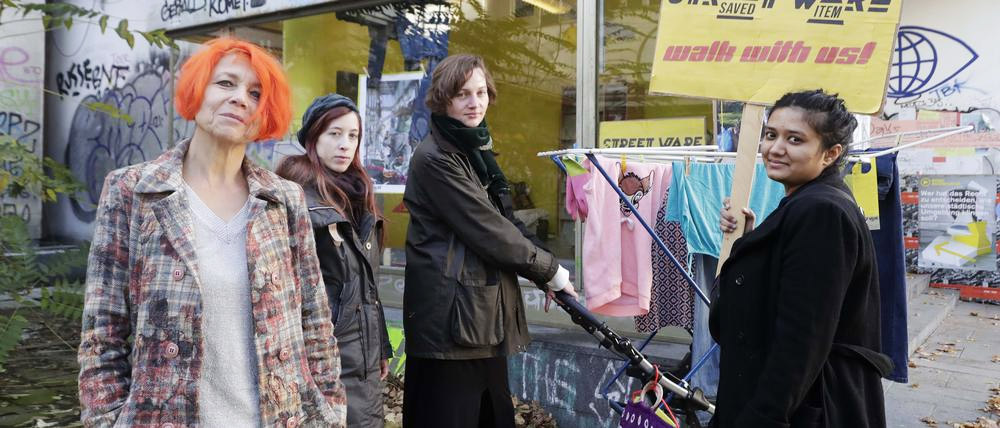
How to measure a man through handwashing
How to measure a man through handwashing
The author Beatrice Lamwaka stichting at Waschsalon 115, Torstraße Berlin | Intervention at the 'Congress on the clothes heap' | 16. – 28.11.2021
Beatrice Lamwaka
At about nine or ten years old, my father taught me how to hand wash my clothes. He was a medical assistant at Gulu Main Hospital and was gone to work most of the weekdays and the only day we had was Saturday. Early in the morning, he would see to his patients who came home with different things including live chicken to pay him for his services. Sometimes, he would call me to untie the chicken legs and that was his way of saying, the chicken was mine. My mother would help me raise them – my only role was to make sure nobody slaughtered them when I didn’t want them to.
By the time my father finished with his patients, I would have fetched water from the well, just a one kilometre from our home, into buckets and basins. Put omo in one large basin and soaked his white shirts.
I remember, as young girls, we used to pride ourselves into carry twenty litres of water. How we shook our growing butts while walking without holding onto the jerricans. Fetching water was fun, it was time connect after school with the girls who lived closed by.
When he was done with his patients and heaps of clothes waiting under the mango tree, we started the washing process. First his white shirts – my father was the only man I saw who wore white shirts in dusty Alokolum. Just a little walk and your feet will be caked in red dust. Up to now, when I visit home, I pick out my dark clothes and a little worn out, so I don’t care to give them out before I return or bother to wash out the dust from them. I still wonder why my father wore white shirts and still had to ride a bicycle eight kilometres to work and later back home – while wearing a white shirt.
After the white shirts, we move to grey and wash and wash until the black clothes are washed and hang on the wire. I still wash my clothes the same way, if I must wash. These days, I employ other women to wash for me, and this means sometimes, some of my clothes may get stained or something happens to them, but I have also learned that I should not let someone else wash my expensive clothes and ruin them before I have ‘worn the money out of them’.
I enjoyed those moments with my father, mainly because I wanted to be close to him. We talked about school and relatives. He was very keen on education. I never missed school unless I was dying. When I got sick, my father would want me to get back to class as soon as possible, while my mother wanted me to stay home a little longer.
My father didn’t have to wash for himself or that I should have helped him. His wife, my mother could have washed for him, but I learned much later in life that my father wasn’t like most men. He was a man who wanted to do whatever he wanted to do.
Our living room at home was where he saw his patients, he took over the responsibility of making sure that it stayed clean. He mopped and cleaned something I haven’t seen or see most men do.
Washing for Boyfriends
In my early twenties at Makerere university, away from home. I expected my boyfriend to wash with me, just like my father did. I didn’t realise how naïve I was. I still expect my partner to help but I know that it’s my responsibility to keep his clothes because anyone who sees a stain or a crease on his clothes will blame me. The wife should have done better.
I still believe that our men should help their wives on partners in cleaning the clothes after all, they wear them and know which part of their clothes get dirty the most and what they did to get them that dirty.
As a young lady, (I think I am) I noticed that it became my duty to wash my boyfriend’s clothes as he was busy reading his books or if I didn’t help, there was a woman – ladies who washed for university students- ready to wash for him. There is always a woman willing to take up the responsibility either for money or anything.
There were stories of boys who found girl friends to make sure that their chores were done, while the boys passed their exams, the girls had re-takes. This may be any girls story now at university or they survived washing for their boyfriends as there is a pandemic and education sector has been closed for more than two years – nothing much has changed.
Other women experiences with washing
Over the years, I have interacted with different women who unlike what we think are not exactly excited to run off and be in dreamy washing land. I didn’t think much about washing of clothes. It seemed like something we must do since we need clean clothes till my kindred friend, barbara caveng introduced me to the topic after she visited Uganda in June 2021. The more I research about washing and the more I spoke to women who washed on daily basis, the more I realized that there is a lot of things that women were going through.
Many women feel that they need help from their male partners who now saw that washing was a responsibility of women. They left it completely in their hands of their women, including the negative criticism. In instances when a man drunk himself silly and wet himself or pooed on his clothes, I have heard even women say, “I pity his wife who will have to wash for him.” No matter how a man dirties himself, there is a woman somewhere who will wash for him.
I decided from an early age that I will take care of my man’s sanitation, but his underwear is not my responsibility. I like to keep some things out of my imagination. I think I have a morbid imagination and some things I just don’t want to think about like how much garlic you ate or how you ate a mango with a knife and the fiber isn’t easy to clean.
Its never an easy conversation but eventually they get that this Acoli woman means business.
There is no gender of washing clothes, but we have now made it female. And the female being has taken it off without question and this needs to change.
We need to have these difficult conversations.



Recent Comments